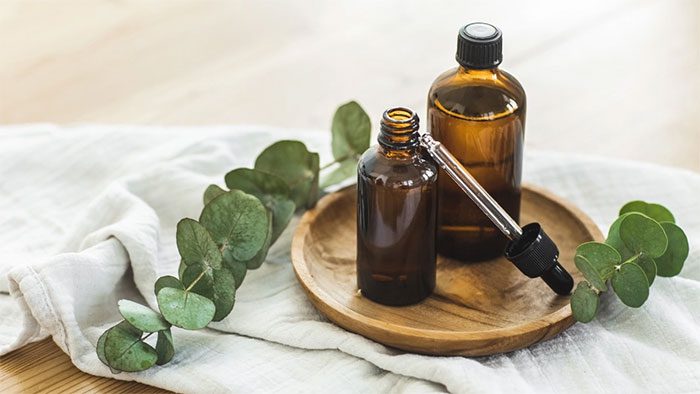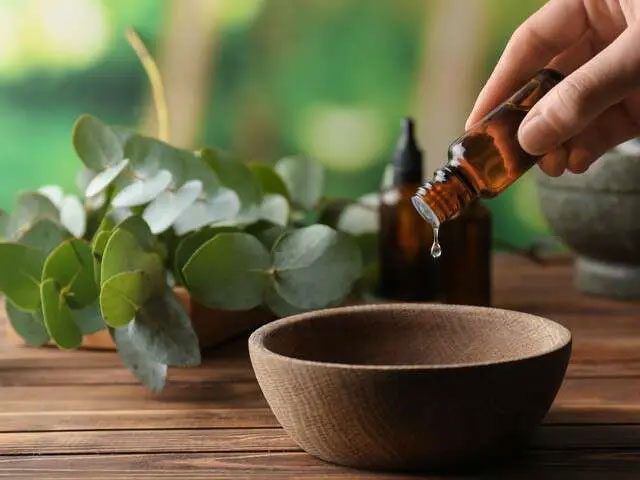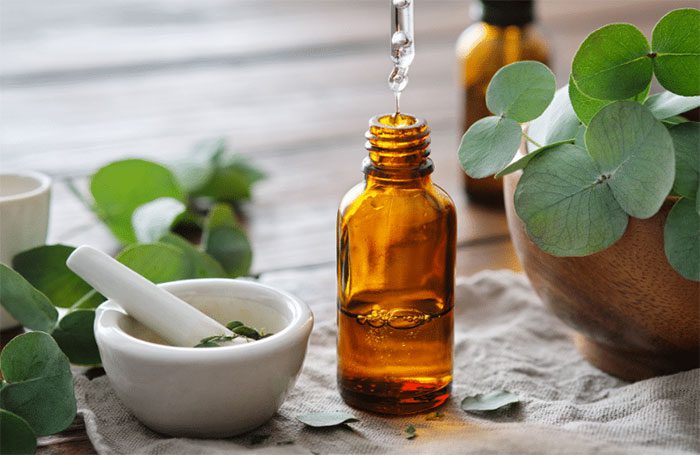Eucalyptus oil is derived from over 100 different components, with its primary chemical constituents being A-pinene, B-pinene, a-phellandrene, 1,8-cineole, limonene, terpinen-4-ol, aromadendrene, epiglobulol, piperitone, and globulol. Below is information about the health benefits of eucalyptus oil, usage instructions, and answers to questions such as who should avoid eucalyptus oil and whether children can use it.
1. Health Benefits of Eucalyptus Oil
The leaves of the eucalyptus tree are dried, crushed, and distilled to obtain essential oil. Eucalyptus oil must be diluted before use.
Reduces Coughing and Warms the Chest and Throat
For many years, eucalyptus oil has been used to reduce coughing and is a common ingredient in over-the-counter cough medications or chest rubs that warm and alleviate discomfort from coughs caused by colds or the flu.

Eucalyptus oil helps warm the chest and reduce cough. (Image: Internet).
Clears Mucus and Reduces Nasal Congestion
Steam inhalation or using a diffuser with eucalyptus oil can help thin mucus and expel it during coughing.
According to WebMD, eucalyptus oil can combat respiratory infections by killing bacteria, viruses, and fungi. This is why you can find eucalyptus oil in many nasal saline solutions.
Insect Repellent
Mosquitoes and other insect vectors can pose health risks, especially as cases of dengue fever continue to rise. Using DEET sprays or eucalyptus oil as an insect repellent is advisable.
Many manufacturers of insect repellents have included lemon eucalyptus oil in their formulations. Note that lemon eucalyptus oil should not be used on children under 3 years old.
A diluted mixture of eucalyptus oil, with about 20 drops, can also be sprayed in areas frequently visited by rodents to deter them safely and effectively.

Eucalyptus oil has long been added to insect repellent formulations. (Image: Internet).
Wound Disinfection
According to Healthline, Aboriginal Australians have used eucalyptus leaves to treat wounds and prevent infections for centuries. Today, diluted eucalyptus oil can be applied topically for its anti-inflammatory properties and to promote faster healing.
Besides diluted forms, you can purchase creams or ointments containing eucalyptus essential oil for minor burns or wounds at home.
Eucalyptus Oil Improves Respiratory Conditions
Respiratory issues such as asthma and sinusitis can be improved by inhaling steam infused with eucalyptus oil. Eucalyptus oil affects mucous membranes, helping to reduce mucus production and thins secretions for easier coughing.
However, for those allergic to eucalyptus, inhaling the oil may worsen asthma symptoms, and more in-depth research is needed to determine the relationship between eucalyptus and asthma before using it as a supportive treatment for symptom relief.
Soothes Cold Sores
Cold sores caused by herpes can be uncomfortable, painful, and itchy. Applying eucalyptus oil to cold sores can reduce pain and accelerate healing due to the strong anti-inflammatory properties of 1,8-cineole, a compound that can block viruses from entering cells by up to 96%.
You can find over-the-counter cold sore ointments containing eucalyptus oil at pharmacies.

Do not ingest eucalyptus oil directly. (Image: Internet)
Freshens Breath
Peppermint is not the only weapon against bad breath. Thanks to its antibacterial properties, eucalyptus oil is commonly used in mouthwashes and toothpaste to combat bacteria causing halitosis.
Additionally, oral care products containing eucalyptus oil can help prevent plaque buildup on gums and teeth, which leads to cavities and periodontal disease.
Reduces Joint Pain
According to Healthline, several studies have shown that eucalyptus oil is present in many over-the-counter topical pain relief creams and ointments that soothe pain from conditions like osteoarthritis or rheumatoid arthritis. While not a primary pain reliever, eucalyptus oil provides a cooling or warming sensation that can make you feel more comfortable with pain.
This pain-relieving effect can also be beneficial for those with back pain or recovering from muscle and joint injuries.
In a clinical trial, individuals inhaling eucalyptus oil after knee replacement surgery reported less pain and lower blood pressure. Researchers believe this may be due to a compound called 1,8-cineole in eucalyptus oil, which interacts with the olfactory system to coordinate with the sympathetic and parasympathetic nervous systems to lower blood pressure.

Eucalyptus oil has a distinct warm aroma. (Image: Internet).
Treats Lice
According to WebMD, in a trial, scientists using tea tree oil and eucalyptus oil to treat lice had results that were twice as positive as the traditional treatment with pyrethrin. This method not only kills 100% of lice and eggs but also has lasting effects after a single treatment.
Other skin tests have also shown no irritation in adults and children.
2. Risks of Eucalyptus Oil
Is Eucalyptus Oil Edible?
Although eucalyptus oil has many benefits, using it in its concentrated, undiluted form can cause toxicity with just 2-3 ml when ingested. Symptoms of eucalyptus oil toxicity can include dizziness, drowsiness, and loss of muscle control. Consuming more than 5 ml can lead to paralysis of the nervous system and even coma.
Symptoms of eucalyptus toxicity typically arise within 30 minutes to 4 hours after exposure. Some cases have reported seizure-like activity within minutes of inhaling eucalyptus oil.
Regarding whether eucalyptus oil is edible, adults should only ingest eucalyptus oil under a doctor’s advice.
Can Children Use Eucalyptus Oil?
Parents should remember to exercise caution when using essential oils for young children in any form. In response to the question of whether infants and young children can use eucalyptus oil, the answer is no.

Can children use eucalyptus oil? (Image: Internet).
Eucalyptus oil contains cineole, which can affect the nervous and respiratory systems in children. With low doses of cineole, we do not have extensive research proving its safety, so it is best for parents to avoid using it on children under 2 years old in topical forms and not to use it as an oral medication for children under 6. Additionally, a baby’s skin is very sensitive, and undiluted eucalyptus oil can cause burns, rashes, and allergic reactions.
If a child accidentally ingests eucalyptus oil and shows signs of difficulty breathing, you must take them to the emergency room immediately.
Moreover, pregnant and breastfeeding women should also avoid using eucalyptus oil.
The above information outlines the health benefits of eucalyptus oil. If you have any pre-existing medical conditions, it is advisable to consult your doctor before use.


















































